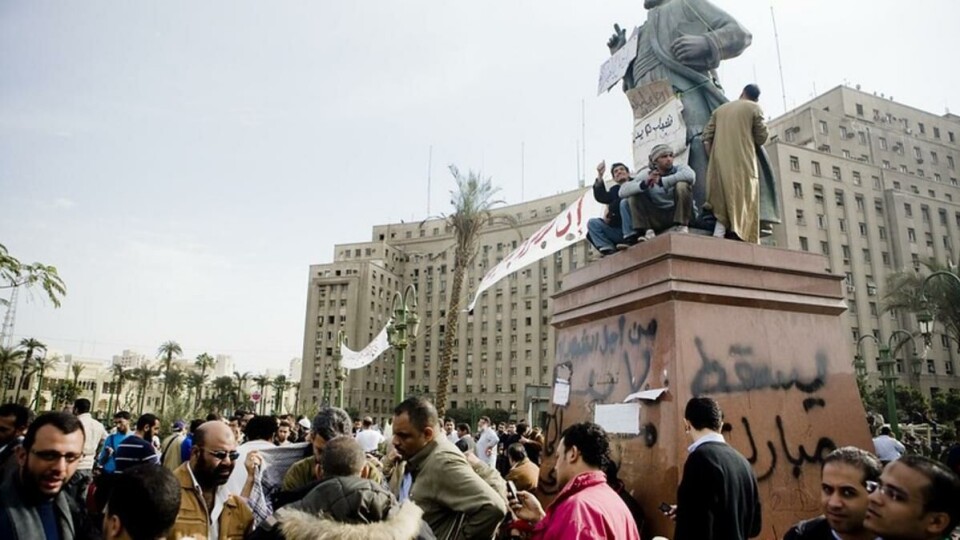
From hope of democracy to extreme oppression: Egypt’s fatal history since the Arab Spring
In 2011, hundreds of thousands of Egyptians protested and demanded democracy. A decade later the country is heading in the opposite direction.
— We were trapped in Tahrir Square, where we were surrounded by the police, Ahmed says.
He’s telling us about the fateful day of January 25, 2011. Ahmed was 15 years old and had just finished school when he and some classmates saw people running towards the city centre in Cairo, the capital of Egypt. They were carrying posters and yelled slogans he had never heard before: «Bread, freedom and social justice», he remembers especially well.
— We had no idea why it was happening, or what they wanted. We saw the police chasing them. We started running with them, because we did not know better. That’s how we ended up in Tahrir.
«Midan al-tahrir» means «Liberation Square» in English. The square became the central gathering place for the protests in Cairo. Two weeks later Hosni Mubarak, the Egyptian president and dictator for almost 30 years, stepped down. The people, with the military’s assistance, had toppled the Egyptian regime.
— The Egyptian people were asleep before the revolution. We knew nothing of the police brutality and what was happening in our country. We awakened with the revolution; Ahmed says.
Critics of the Egyptian regime are in many cases brutally repressed. Universitas has therefore chosen to refer to him by only his first name.
— We saw people dying
The protests were part of what we, in Western countries, refer to as the Arab Spring.
— It is a term used in media and in the West. We call it the revolution. Not a lot of Egyptians will know what you mean when you say Arab Spring, Ahmed explains.
He describes an unreal and chaotic situation on his first day at Tahrir Square.
— We didn’t understand what was happening, and just wanted to go home. There were so many people. We were very scared and confused, he says.
People don’t know what is happening in our country. We have to wake up and open our eyes
Ahmed (25), Egyptian
The mobile network was down, and he couldn’t contact his family. He and his friends spent hours trapped in Tahrir Square.
— We started asking people what this was, and after a while we understood. We saw what the police did to the protestors, and the injustice people were subjected to, he continues.
— We went to Tahrir Square the next day, fully aware. We joined them and yelled that the people wanted the regime to fall.
Ahmed and his friends participated in the protests for three more days, with over 250,000 people. They were met with a police crackdown. More than 800 people died, and more than 6,000 were hurt.
— We saw people dying. I honestly thought they died in vain. I thought nothing was going to change, he remembers.
He was therefore surprised when the Egyptian president stepped down on the 11th of February.
— Initially I was very happy, but I quickly became concerned. I thought, who will lead us now? After a while I was also concerned about what would happen when we saw what was happening in other Arab countries, he says.
He feared that war, conflict and foreign intervention would also come to their country.
This would not be the case for the Egyptians. The reality was, however, far from what the protestors had imagined.
Discontent among the Egyptians
— It has gone very badly for Egypt. A military regime more dictatorial than ever has developed, says Bjørn Olav Utvik, professor of Middle East Studies at the University of Oslo.
To understand this development, we have to go back to the mid-90s. Military coups were happening in several Middle Eastern countries, including Egypt. There, Gamal Abdel Nasser had seized power in 1952. He abolished the monarchy and British influence, with promises of better times for Egyptians.
— In Egypt, and other countries in the area, there were mostly stable, but dictatorial regimes that ruled for their own advantage. There were elite groups who were not interested in sharing power, Utvik says.
Hosni Mubarak came to power in 1981. He ruled the country for almost 30 years, and despite discontent it was relatively calm – until January 2011.
— The discontent among the population was great. There was a lack of development, freedom and democracy, and corruption was widespread. The opportunity for uprisings was lying dormant, Utvik explains.
— And when it burst in Tunisia, I thought: Now anything can happen.
After the greengrocer Mohammed Bouazizi set fire to himself in anger over own experiences with police corruption, Tunisians took to the streets and demanded that the president step down. When the Tunisian president, Ben Ali, fled the country on January 14, optimism spread throughout the region.
All political freedom that was won through the uprisings in 2011 is gone
Bjørn Olav Utvik, professor of Middle East Studies at UiO
In addition to the euphoria in Tunisia and the general discontent among the population, Utvik mentions high food prices, discontent among opposition politicians, and Mubarak’s hints that his son would take over as president, as sources for anger among the population.
— Not everyone had a political awareness of these problems. But it was universal to have experienced the system as corrupt and that the authorities harassed the population. It led to large demonstrations and wide support from the entire population, Utvik says.
— The military never let go of the power
Immediately after Mubarak stepped down, the military seized power. They were supposed to accommodate for a new democratic era in Egypt.
— It’s easy to forget that there was a phase from Mubarak’s fall until mid-2013 that is completely unique in Egypt’s history. There was political freedom and pulsating political life, Utvik says.
Democratic measures were implemented. The freest elections in the history of Egypt were held, where Muhammed Mursi from the Muslim Brotherhood was made president. At the same time, disagreement among political groups grew.
The conflicts put the democratic processes on hold. With economic development still being slow, unrest arose again among the population. On July 3, 2013, the military seized power from Egypt’s first, and only, democratically elected president.
— In hindsight, it is easy to see that the military never really let go of the power, Utvik says.
In the following year, Abdel Fattah al-Sisi, Mursi’s Minister of Defence and a central figure in the military coup, became Egypt’s president. The election result, which is internationally assumed to be manipulated, gave al-Sisi 96 percent of the votes.
He is today still the leader of what Utvik describes as the worst dictatorship ever.
No political freedom
Ahmed is living in the middle of this. The 25-year-old is under the impression that many Egyptians support al-Sisi and believes he has implemented good measures for the country. Ahmed himself believes that the president should have different priorities, and that deep social issues are still problematic in the Egyptian society.
— He prioritises roads, bridges and infrastructure. He’s also going to build a new capital. That’s not what people need. Better schools and health services are more important, he says.
The 25-year-old talks of bad conditions at public schools and hospital. This affects regular people, and especially the poor.
— I believe that much would be different if Egyptians had access to good education. People don’t know what is happening in our country. We need to wake up and open our eyes!
Utvik also describes a very gloomy shadow side of politics.
— All that was won of political freedom through the uprisings in 2011 is gone. Today there are around 60,000 political prisoners. The Muslim Brotherhood and other oppositional groups are banned and defined as terrorist organisations without evidence, Utvik says.
Political freedom is what clearly separates al-Sisi’s regime from Mubarak’s.
— Mubarak was a dictator that allowed space for public debate. Opposition parties were allowed to exist and could win something in elections, even though they never got any power, he says and adds:
— Mubarak allowed certain political openness, which has been completely off the table for al-Sisi.
New uprisings may come
Ahmed is a pessimist. He doesn’t see a way for Egypt to change in the near future. Utvik doesn’t believe that al-Sisi will hold on to power for as long as Mubarak.
— Those disagreements that led to uprisings in 2011 haven’t gone away. Corruption and economic problems are still the reality for a majority of the population, Utvik says.
He thinks the problems will re-surface sooner or later.
— The only way al-Sisi is containing the situation is by repressing the population. Even though he has repressed the groups that want change, it’s only a matter of time, from my perspective as a historian. It is brewing in the entire region now, he says.
Much would be different if Egyptians had access to good education
Ahmed (25), Egyptian
He says he is a pessimist for the short term, but optimist in the long-run.
— I’m not a full-blown optimist. It takes many years to create a stable democracy. We have to expect some turbulence, he says.
Significant class divides
— There are only two ways to live happily in Egypt now. Either you have to have a lot of money – then you can live your best days in Egypt, with good schools, hospitals and afford to live in safe and good areas. If you don’t have a lot of money, you have to hope that the society will change, he says.
He believes the significant class divides are Egypt’s greatest problem. He describes corruption and how connections in working life affects many young people.
— I have a good education from the university, and I got very good grades. Still, I have friends who have more «wasta» than me, who got the jobs I deserved. It was depressing.
«Wasta» is an Arabic word that can be understood as «nepotism». People with wasta have good connections and contacts and can use those to get ahead, rather than other qualifications. Ahmed hopes a re-structuring of society will reduce poverty and lead to a larger middle class.
First he wants to move abroad for a while. He’s not sure where he wants to go or for how long.
— It depends on how much money I can earn. If I get enough money so that I can return to Egypt and live a good life, I will come back. I have to focus on myself and my own life, he says, and concludes:
— I can’t do anything to change anything now. I can only hope that it will get better, and that I will experience the country changing someday.

































